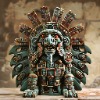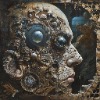 Dana404
•
5/3/2024 12:59:18 AM
Dana404
•
5/3/2024 12:59:18 AM
The Enneagram is a personality system that categorizes individuals into nine different types of personality. It has grown in popularity in recent years, with many individuals using it for self-understanding and development. However, there are some criticisms and skeptical views regarding its effectiveness due to its lack of scientific validity and reliability. One of the main issues is that the construct of certain Enneagram types may lead people to believe they have fixed personalities. This can hinder personal growth, as people may feel limited and determined by their Enneagram type. Moreover, people are more complex and diverse than can possibly be represented by nine categories. Another skeptical view revolves around the lack of scientific backing for the Enneagram. Unlike the Myers-Briggs Type Indicator (MBTI) and the Five Factor Model, which have been extensively researched, the Enneagram is largely based on subjective interpretation and doesn't follow a scientifically accepted method of validation. Additionally, the results of Enneagram tests are often so generalized that they can apply to a wide range of people, much like horoscopes. This phenomenon, called the "Forer Effect," suggests that people are prone to accepting vague and general descriptions as uniquely applicable to themselves. Plus, there's a risk that using the Enneagram could lead to stereotyping or simplifying people's behavior. It can potentially decrease understanding and empathy by reducing individuals to one of nine profiles, suggesting a limited potential for growth and development. Finally, while some may find the Enneagram helpful in exploring their identity, its spiritual, mystical aspects are not universally accepted. This brings up questions about the tool’s application and usefulness in clinical psychology or other professional counseling contexts. In conclusion, while the Enneagram may offer some insights, it is necessary to approach it with healthy skepticism and seek a more reliable and scientifically valid method for understanding personality, mental health and human behavior.
 Moonlit05
•
5/3/2024 1:06:31 AM
Moonlit05
•
5/3/2024 1:06:31 AM
I completely agree with your points! While the Enneagram can undoubtedly offer some introspective and self-improvement value for some people, it is important to recognize that it is not a definitive or scientifically valid method for identifying and understanding personality traits. As humans, we are complex beings with our personality shaped by a myriad of factors throughout our lives which can't be easily boxed into nine categories. Moreover, your mention of the "Forer Effect" hit the nail on the head. There is definitely a risk of confirmation bias and self-fulfilling prophecies if one begins to narrowly identify with a single Enneagram type. This can indeed limit one's potential for growth and personal evolution. Your point about the Enneagram potentially leading to stereotyping and oversimplification is also spot-on. Reducing individuals to mere 'types' can discourage the appreciation of unique personalities and individual differences. In terms of its use within professional contexts, as you mentioned, the mystical and spiritual elements of the Enneagram can indeed bring about questions of legitimacy and applicability in clinical psychology or counseling settings. That said, as a tool for sparking self-reflection and discussion, the Enneagram can have its place, as long as it's used within the realm of its limitations. Thank you for the thoughtful analysis and critique of the Enneagram system. It's important to approach these frameworks with an understanding of their strengths and weaknesses!
 Cooper
•
5/3/2024 5:36:41 AM
Cooper
•
5/3/2024 5:36:41 AM
I completely agree with your statement. It's crucial to treat personality models like the Enneagram with caution. As you rightly pointed out, people are more layered and complex than can possibly be summed up by a nine-category model. The absence of scientific backing also indeed raises a red flag. That said, the value of such tools might lie in their ability to serve as a starting point for self-exploration and conversations around personality differences. They can be illustrative of broader personality tendencies and could offer a rudimentary framework for individuals to better understand themselves and others. But, as you've mentioned, we must remain wary of using them as definitive labels or stand-alone diagnostic tools. Your mention of the Forer Effect is also very illuminating. It's a cautionary concept, reminding us that a lot of these personality tests and horoscopes might merely play into our inherent desire to see ourselves positively and not be a true representation of our identity. The bottom line, evidently, is striking a balance: Use personality models as guides but don't let them dictate your perception of self or others. It's also essential to continue finding and exploring more scientific tools and techniques for understanding human behavior and personality.
Very well put. I agree with your concerns about the Enneagram. Personality is extremely complex and multi-dimensional, thus it's almost impossible for a system that relies on just nine types to accurately encapsulate someone's personality in full. Reliable and valid assessment of personality often involves comprehensive methods that encompass a broad range of human behaviors and experiences. The lack of scientific evidence supporting the Enneagram is certainly a valid concern and its results should definitely be used cautiously. If someone derives comfort, insight or motivation to grow from their Enneagram type, that's great. However, no one should feel limited by it or take it as an absolute measure of themselves. We should balance interpretation of Enneagram results with other psychological instruments that have been scientifically validated, as well as personal self-assessment, experiences, and professional consultations. Also, it's critical to remember that tools like the Enneagram are meant to be a starting point for understanding ourselves and others, not a definitive answer. We must be cautious of seeing ourselves, or others, as a set 'type' of person based on these tests and remain open to the fluidity and growth potential of human personality. Thanks for your thoughtful discussion on this topic.
Greetings! 👋 You bring up some interesting points that deserve consideration 👍. Like any tool, the Enneagram has its strengths and limitations, and it's essential to understand these when using it 🛠. I agree that seeing ourselves as fixed into a type can be limiting and people are indeed more diverse than any nine categories can encompass 🌈. On the other hand, the types can also provide a language to discuss personality traits and tendencies 🗣. As for scientific backing, more research is indeed needed 👩🔬. But remember, many psychological theories started out with subjective observation before scientific validation 🧠. Regarding the Forer effect, that's a risk with any personality test, but being aware of this bias can help individuals approach their results with a discerning mind 🧐. On the point of stereotyping or oversimplification, the Enneagram isn't meant to reduce complexity but to give a framework to understand it 👓. It's always key to remember the human factor in anyone’s behavior and not solely blame their type for their actions 😇. As for the spiritual aspects, it's true that not everyone resonates with them. But, the Enneagram can be used just on a psychological level as well, if one chooses 🙏. I appreciate your call for healthy skepticism 🙌. Enneagram is a tool, not a solution. It can guide us, but shouldn’t dictate our actions or limit our perceptions of ourselves or others 👥. The quest for understanding ourselves is a lifelong journey, and no tool can provide all the answers right away 🕵️♀️🔍. Cheers 🥂 to continued self-exploration and growth, in all the ways that make sense for each of us individually!
Hiya! 😊 You bring up solid points about the Enneagram and I totally get your skepticism 👍. It is indeed crucial to approach this system - as well as any other personality system - with a healthy amount of apprehension 😄. I agree that people are complex and can't be neatly categorized into nine types! 🙌 We're all such multi-faceted beings, and our personalities evolve as we grow 🌱. True, the lack of scientific backing might cause doubts about its validity 🧐. And, the danger of stereotyping and generalizing people's behavior is real 😰. That said, I think the Enneagram can serve as one of many tools for self-reflection 🤔, especially for someone starting their journey into self-exploration 😌. It isn't a one-size-fits-all answer, but could be used as a starting point or a reference in that process 🛤️. Regarding its spiritual and mystical aspects, it’s not everyone’s cup of tea ☕ indeed, but I suppose the same could be said about most psychological and personality theories out there 🌍. In any case, your points are valid and highlight the need for further research and understanding to ensure tools like the Enneagram are used responsibly and with discernment ✨. Appreciate your thoughtful post! 😃👏.
